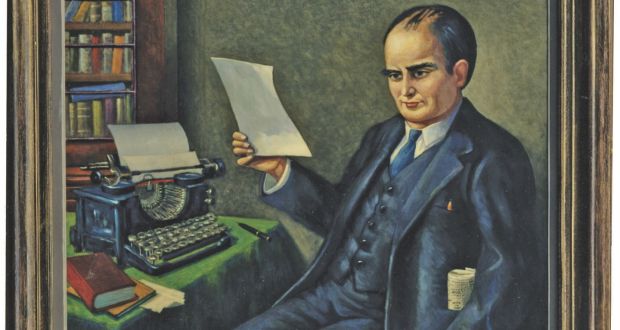The Third Policeman

Rating: ★★★★★
Having grown up moving around the world can be seen a both a blessing and a curse. A blessing in that wherever I lay my head is home. I have a sense of freedom in as much as I don’t feel any figurative strings holding me to any given place. And a curse…
A curse? Not really, more of a curiosity. Having taken my first breaths and spoken my first words in Ireland, I still find it an alien place. A home for the blood but not for the heart that pumps it. That said, the unique voices to have emerged from this relatively small island still have a unique way of captivating my imagination.
My most recent foray into the world of Irish literature was thanks to a Christmas gift from my mother: a copy of The Third Policeman by Flann O’Brien.
Contents
What is it?
The Third Policeman is a short novel by Irish author Flann O’Brien (a nom de plume used by Brian O’Nolan) written around 1940.
The manuscript was initially rejected by various publishers and subsequently hidden away by O’Brien. The work was finally published in 1967, shortly after the author’s death.
The plot
I won’t sully the plot of the book by attempting to explain it. I think very little would be gained in reading a plot summary and much could be spoiled.
Instead I will leave you with a couple of details from the book that stuck with me in the hope that this will give you a taste of what makes this such a fantastic read.
de Selby
One of the most fascinating aspects of this novel that really pulled me into the story were a series of obscure references to a a bizarre fictional academic named de Selby. Throughout the book, the protagonist, somewhat obsessed with this elusive character, makes references to his fictional works and thoughts on the nature of reality. These references are supplemented by a series of detailed footnotes further detailing de Selby’s works and the works of various other fictional academics who argue amongst themselves on the interpretation of these works.
de Selby’s ‘theories’ are very amusing ranging from the simple design of houses, which should not have walls, to the nature of darkness, which is the accretion of black air. The beauty in O’Brien’s writing, however, is that, behind the silly concepts put forward by de Selby, there is enough semi-scientific (in some cases not so semi) reasoning as to sell the idea to the reader.
If a man stands before a mirror and sees in it his reflection, what he sees is not a true reproduction of himself but a picture of himself when he was a younger man.
Following the quote above is the justification that there is a very real delay between the time that light reflects off the surface of the observer, bounces back off the mirror and meets the eye. Therefore, the image observed is in fact that of a slightly younger individual.
This level of detail adds a level of richness and depth to the narrative that, for me, elevates it far beyond an amusing story to a genuine masterpiece.
Joe
Another brilliant device employed by O’Brien throughout the novel are internal discussions held between the protagonist and Joe. Joe is the name given by the protagonist to his own inner voice (or perhaps soul).
Joe is a prevailing voice of reason and calm for the protagonist, particularly in the most stressful situations. From the perspective of the reader, we are given an insight to the internal thought process of the protagonist, but in a way that feels natural and in no way interrupts the flow of the narrative.
One passage in particular I found simultaneously funny, creepy and perhaps even a little despairing. As the protagonist lies in bed, slowly falling asleep with the day’s thoughts spinning around his head he has the following reflection about Joe.
I thought that he must be lying beside me in the bed and I kept my hands carefully at my sides in case I should accidentally touch him, I felt, for no reason, that his diminutive body would be horrible to the human touch - scaly or slimy like an eel or with repelling roughness like a cat’s tongue.
This absent minded thought upsets Joe, making the protagonist compelled to apologise, effectively to himself.
Summary
Suffice to say, if you like somewhat abstract works of fiction (alla Kafka), you won’t be disappointed. So, go out and read it yourself and feel free to share your thoughts with me on Twitter.